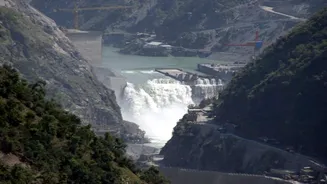RBI's Rate Pause
The Reserve Bank of India (RBI) economists supported the decision to pause on interest rate hikes, citing a decline in inflation coupled with a robust
economic growth. This stance indicates confidence in the economy's ability to withstand current global economic challenges. Economists' backing of the pause reflects their assessment of the current economic situation. This is based on evaluations of inflation trends and indications of continued economic progress within the country. It also likely considers the impact of global events on the nation's economic performance.
Cooling Inflation Trends
A key factor influencing the RBI's stance is the observed cooling of inflation. Lower inflationary pressures provide the central bank with increased flexibility in its monetary policy decisions. When inflation subsides, it can open avenues to maintain stable interest rates or even decrease them, which can help support economic activity. This also provides the conditions that enable sustained growth, while controlling the cost of living for citizens. Monitoring these trends is crucial for effective economic management.
Sustained Economic Growth
Despite global uncertainties, the Indian economy has demonstrated continued strength, which is another justification for the RBI's rate pause. Strong economic growth provides the country with the ability to weather storms and promotes stability. This sustained expansion, combined with moderating inflation, enables the RBI to maintain its current policy without causing any harm to the nation's economy. The strong economic performance also offers incentives for domestic investments and economic expansion overall.
US Visa Policy Impact
The article alludes to the repercussions of potential US visa policies, like the $100,000 visa targets, that might affect India. The potential impact of such policies on Indian professionals and the broader economy cannot be ignored. The implications extend to both skilled workers seeking opportunities and their contributions to the country's economic activities. The discussion of the US policies reflects the global interconnectedness and the effect that international events can have on India's economic narrative and future plans.
China's 'Sea Turtle' Model
The article brings up the 'Sea Turtle' model that China has successfully implemented. This model likely involves strategies to reverse the potential brain drain, which may result due to stringent visa policies. A 'Sea Turtle' strategy may assist in attracting highly skilled Indian professionals back to India, which can promote innovation and economic development. This approach suggests a focus on domestic initiatives to boost the economy. Considering and understanding these strategies can allow the Indian economy to adapt to changing situations.
Economic Implications
The combined impact of the RBI's monetary policy and changes in international visa regulations can affect India's economic outlook. The policies that are decided on are influenced by global economic events. Understanding these interconnections is crucial for businesses and citizens. These dynamics require India to adopt flexible strategies to sustain economic growth and navigate the intricate challenges and opportunities.












